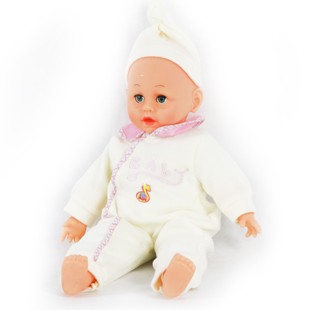(单词翻译:单击)
听力文本
This is Scientific American — 60-Second Science. I'm Christopher Intagliata.
Used to be, teenage kids had to carry around a bag of flour wrapped in a blanket to learn the responsibilities of parenthood. But these days? The same lesson is taught with hi-tech dolls that cry and record every interaction.
"You know they get grumpy, you have to rock them to calm them down, they have to be fed." Sally Brinkman, an epidemiologist at the Telethon Kids Institute, in Australia. "It's supposed to be so tiring and so difficult that it puts them off and they say 'I don't want to be a teenage mom.' And then they think about contraception and all of those sorts of things."
Problem is, that theory — that the dolls will discourage teenage parenthood—doesn't seem to be true, according to a new study by Brinkman and her colleagues. The team recruited nearly 3,000 13- to 15-year-old girls for the trial, from 57 schools in Western Australia. All the girls got the standard Australian curriculum on contraception and sexual health. But half had to care for the infant dolls—and got extra education sessions with the school nurse.

The team's hypothesis? "We thought either it's going to make a difference, or it's going to make no difference whatsoever. We hadn't expected that it would do the opposite." And in fact, the girls who cared for the dolls were nearly one and a half times more likely to get pregnant before age 20, than teens in the control group. The findings are in The Lancet.
The company that makes the dolls has criticized the trial, and says the researchers didn't properly implement the educational portion of the program. But Brinkman disagrees. Maybe, she says, the program itself is flawed. "If we're inadvertently increasing teenage pregnancy rates, you know, this program needs to stop. We shouldn't be delivering it in schools."
Thanks for listening for Scientific American — 60-Second Science Science. I'm Christopher Intagliata.
参考译文
这里是科学美国人——60秒科学。我是克里斯托弗·因塔利亚塔。
以前,十几岁的孩子在学习为人父母的责任时要带着裹在毯子里的一袋面粉。那现在呢?现在,同样的课程用可以哭还可以记录所有互动的高科技娃娃来完成。
“你知道他们会生气,你要抱着他们轻轻晃动来让他们平静下来,你要喂他们吃东西。”萨莉·布林克曼是澳大利亚特里松儿童研究院的流行病学家。“这既累人又很难,会让他们失去耐心,他们会说‘我不想当年轻妈妈。'然后他们会考虑避孕和其他相关问题。”
问题是,娃娃会让年轻父母感到泄气的理论看起来并不正确,这是布林克曼和她同事进行的新研究得出的结论。布林我曼和她的团队从西澳大利亚57所学校招募了近3000名13至15岁的女孩进行试验。所有女孩都在澳大利亚国家标准课程学习了避孕和性健康的知识。其中有一半女孩曾照顾过婴儿娃娃,而且在护校学习了额外的教育课程。
该团队的假设?“我们认为,结果要么有区别,要么就完全没有区别。我们没想到结果恰恰相反。”实际上,曾经照顾过娃娃的女孩可能在20岁以前怀孕的机率比对照组中的女孩高出1.5倍。这一研究结果发表在《柳叶刀》期刊上。
生产这种娃娃的公司对这项试验进行了指责,他们认为研究人员没有妥善实施该项目的教育责任。但是布林克曼不同意这种说法。她说,也许这个项目本身就存在缺陷。“如果我们无意中使少女怀孕率上升,那这个项目就要停止。我们不应该在学校里进行这个项目。”
谢谢大家收听科学美国人——60秒科学。我是克里斯托弗·因塔利亚塔。
译文为可可英语翻译,未经授权请勿转载!
重点讲解
重点讲解:
1. calm down (使)平静下来;(使)镇定下来;
例句:His rage was soon calmed down by the rustic peace.
乡村的宁静很快就使他的怒气平静下来。
2. put off 使反感;使对…失去兴趣;
例句:The high divorce figures don't seem to be putting people off marriage.
离婚的人很多,但这好像并没有打消人们对结婚的热情。
3. care for 照料;照顾;护理;
例句:It seemed to be her mission to care for her brother's children.
照顾她兄弟的孩子似乎成了她一生的使命。
4. in fact (用于修正、引出相反意见或对比等)事实上,其实;
例句:No doubt he means to help, but in fact he just gets in the way.
他确实是想帮忙,然而事实上却只是帮倒忙。


